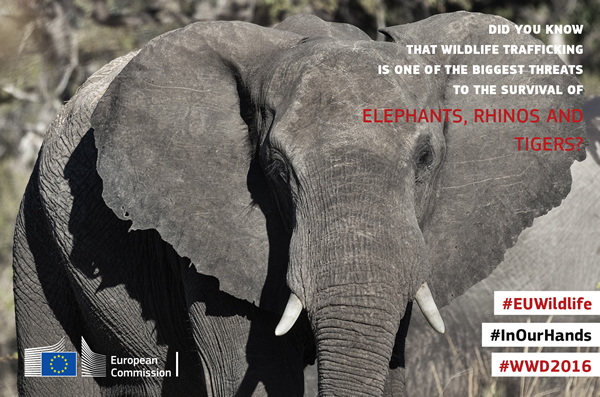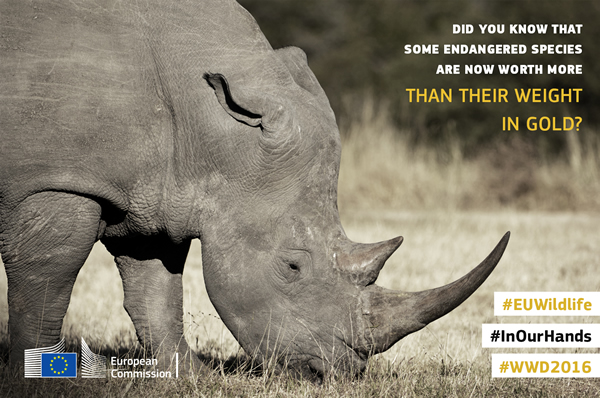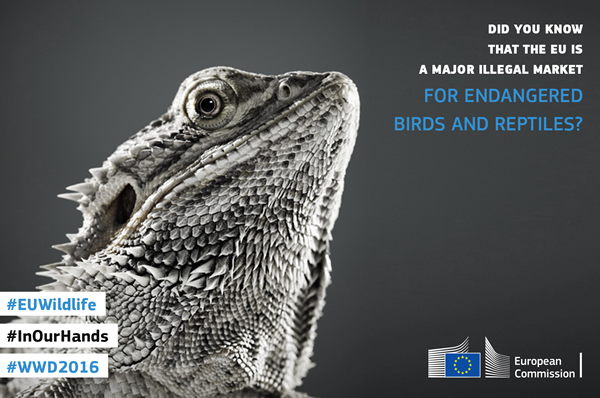E.U. Introduces New Plan to Curb Illegal Wildlife Trade
On February 26, the European Commission adopted a Communication on the E.U. Action Plan against Wildlife Trafficking which sets out a comprehensive blueprint for coordinated efforts to fight wildlife crime inside the E.U.
The plan calls for greater enforcement, better cooperation and more effective prevention. It seeks to foster more active engagement with business, those active in wildlife trade or using wildlife products and those that provide services to the trade, and cites E.U. commitment to the responsible management of global supply chains.
The plan is to be implemented jointly by the E.U. (Commission services, EEAS, Europol, Eurojust) and its Member States until 2020.

A Growing Problem
Recent years have seen a dramatic surge in wildlife trafficking. An estimated eight to 20 billion euros ($22 billion) pass annually through the hands of organized criminal groups, ranking alongside the trafficking of drugs, people and arms. The issue threatens security in Central Africa, where militia and terrorist groups partly fund their activities through wildlife trafficking.
Karmenu Vella, EU Commissioner for Environment, Fisheries and Maritime Affairs said: “Wildlife trafficking is a major threat to our sustainable future, and we need to fight it on several fronts. At this rate, a child born today will see the last wild elephants and rhinos die before their 25th birthdays. The new action plan underlines our commitment to ending this criminal activity, bringing together political will and action on the ground."
The E.U. is a destination, source and transit region for trafficking in endangered species. The action plan comprises 32 measures to be carried out between now and 2020 by the E.U. and its 28 Member States. It focuses on three priorities:
• Prevent trafficking and reduce supply and demand of illegal wildlife products: for example by the end of 2016 the Commission will prepare guidelines aiming to suspend the export of old ivory items from the E.U.
• Enhance implementation of existing rules and combat organized crime more effectively by increasing cooperation between competent enforcement agencies such as Europol
• Strengthen cooperation between source, destination and transit countries, including strategic E.U. financial support to tackle trafficking in source countries, help build capacity for enforcement and provide long term sources of income to rural communities living in wildlife-rich areas
Measures included in the plan are – among others – proposals for all E.U. countries to consider wildlife trafficking a serious crime under the United Nations’ Convention against Transnational Organised Crime – and as recommended by the U.N. General Assembly Resolution on ‘Tackling illicit trafficking in wildlife’ – with custodial sentences of at least four years for those convicted, creating a significant deterrent.

TRAFFIC Support
The plan was drawn up following extensive public consultations to which environmental organization TRAFFIC contributed.
“TRAFFIC warmly welcomes the publication of this comprehensive action plan,” said Katalin Kecse-Nagy, TRAFFIC’s Acting Regional Director for Europe.
“Clearly ongoing monitoring is essential to judge whether the plan is being effective, and TRAFFIC encourages the European Commission to develop a set of indicators as part of their assessment process,” said Kecse-Nagy.
The plan acknowledges the role the private sector could play in helping bring about change, drawing particular attention to a study carried out by Ricardo Energy & Environment in collaboration with TRAFFIC on “Strengthening cooperation with business sectors against illegal trade in wildlife.”

Transport Sector Involvement
The report states that engagement of transport companies in tackling the problem has been low but, globally at least, has seen a recent surge in renewed efforts, particularly in relation to air transport. Given the interest and current levels of engagement of the airline sector, it may be that efforts to develop concrete action with airlines initially will subsequently fuel interest and engagement by other parts of the transport sector, such as shipping and container vessels, states the report.
“TRAFFIC also welcomes the aims of the Commission to ensure consistent implementation of the plan with other exiting E.U. policies related to illegal trade in natural resources, such as those on Illegal Unreported and Unregulated (IUU) fishing and timber trade.”
“The challenge now is to ensure the plan is fully implemented, something that is dependent on securing high-level political commitment from all E.U. Member States, including their endorsement of the plan in Council,” said Kecse-Nagy.
Global Action
Numerous measures to combat wildlife trafficking have been adopted under the Convention on International Trade in Endangered Species (CITES), a key international treaty regulating the international trade in wildlife, to which the E.U. became a party in 2015. The United States have set up a Presidential Task Force and adopted a national strategy against wildlife trafficking. Key market countries such as China are showing increased engagement, notably through stronger enforcement efforts, and the will to cooperate more closely with the E.U. on these issues. The African Union has started implementing a continent-wide strategy.

that matters most
Get the latest maritime news delivered to your inbox daily.

The E.U. Communication is available here.
